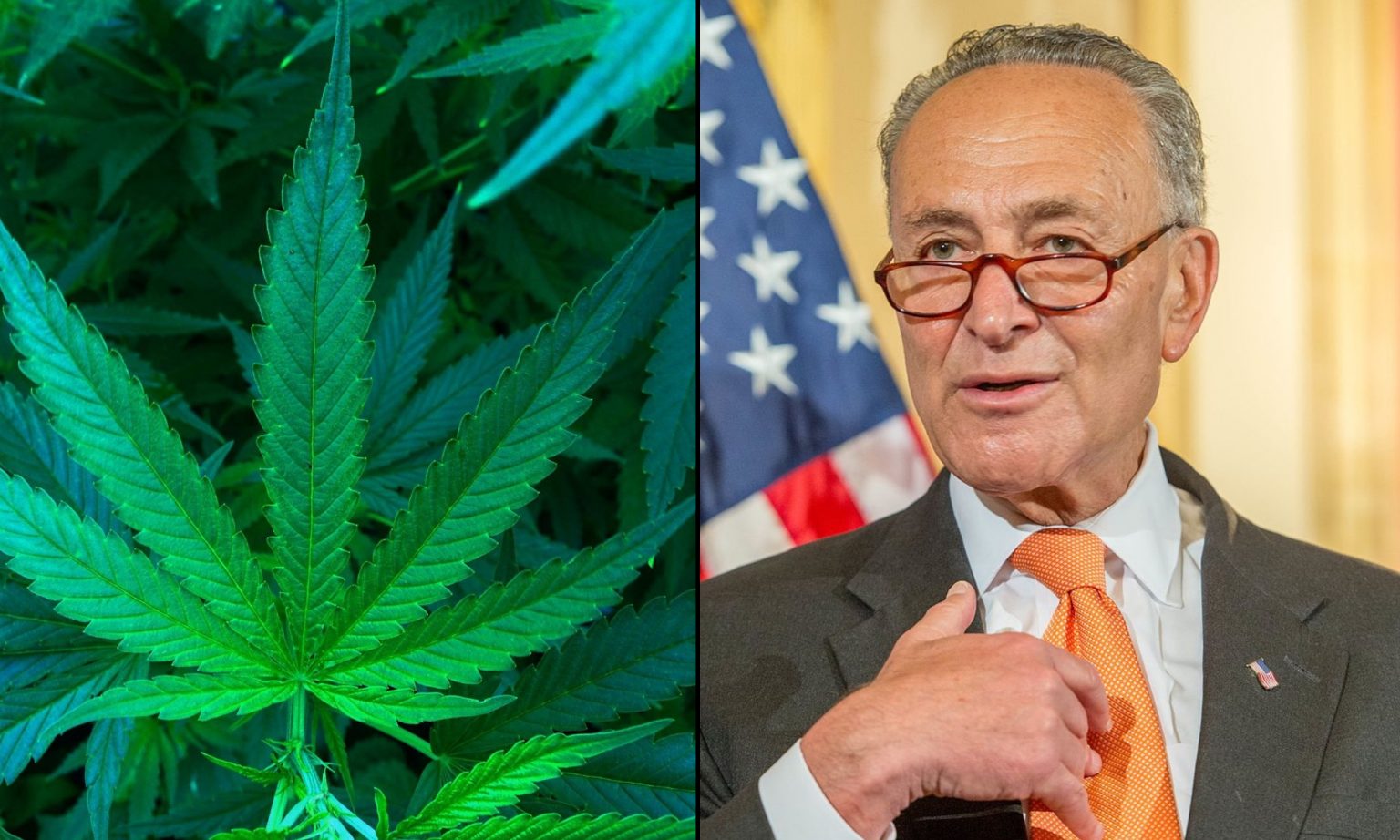Schumer And Pro-Legalization GOP Congressman In Talks Over Marijuana Banking And Expungements Compromise
Senate Majority Leader Chuck Schumer (D-NY) has held recent talks with a key GOP House lawmaker about possible interim, bipartisan cannabis reform steps that can be taken as he continues to finalize a comprehensive legalization bill, staffers from both offices told Marijuana Moment on Thursday.
The discussions touched on a broad range of cannabis reform proposals, including the possibility of combining two pieces of existing bipartisan legislation: the Secure and Fair Enforcement (SAFE) Banking Act and the Harnessing Opportunities by Pursuing Expungement (HOPE) Act.
Rep. Dave Joyce (R-OH) had a meeting with Schumer this week to go over possible avenues of interim reform like the SAFE Banking Act or the HOPE Act, which he’s sponsoring alongside Rep. Alexandria Ocasio-Cortez (D-NY). That measure would incentivize states and local governments to expunge cannabis records in their jurisdictions.
The congressman talked briefly about a preliminary conversation he had with the Senate leader at an International Cannabis Bar Association conference on Thursday, as first noted by Politico.
Joyce’s office later clarified Politico’s initial characterization of the progress of talks with Schumer in a statement to Marijuana Moment.
“The conversation between Leader Schumer and Congressman Joyce was part of an ongoing, broader discussion between both parties and chambers to determine what reform can pass this Congress,” a senior staffer with Joyce said. “It is evidence of the sincere efforts by both the leader and the congressman to find common ground for substantial, bipartisan progress on this issue. The congressman remains hopeful that an agreement can be made and progress can be achieved.”
Meanwhile, advocates and stakeholders are eagerly awaiting action on the SAFE Banking Act from Rep. Ed Perlmutter (D-CO), which would safeguard financial institutions that work with state-legal cannabis businesses—a reform that Joyce also strongly backs. That legislation is currently being debated as part of a bicameral conference on a large-scale manufacturing bill called the America COMPETES Act.
Schumer has been insistent that marijuana legalization with social equity components should advance first before the marijuana banking bill, and he’s said that he plans to introduce a final version of his bill to broadly end prohibition, the Cannabis Administration and Opportunity Act (CAOA), before the congressional August recess.
The prospects of reaching the 60-vote supermajority threshold that would be required to pass that bill in the Senate, with a slim Democratic majority, are dubious, however. So the newly disclosed detail that Schumer has met with Joyce, a member of the Congressional Cannabis Caucus, signal that a compromise may be afoot.
However, Joyce’s office stressed that no deal has yet been reached. Schumer’s office also confirmed the meeting with Joyce to Marijuana Moment.
Meanwhile, Schumer is reportedly pushing back against attempts to include the SAFE Banking language in the America COMPETES Act. A source familiar with separate discussions between the leader’s office and another top Democratic senator told Marijuana Moment that Schumer has urged his colleagues not to push for the banking reform’s inclusion in the final package of the large-scale bill, as it may undermine the ability to pass a slightly broader cannabis reform package such as the possible one including expungements that has been preliminarily discussed with Joyce.
There has been significant bipartisan support for the SAFE Banking Act in the House, and the reform enjoys relatively substantial support from Senate Republicans such that advocates believe it could get enough support to pass that chamber with the needed supermajority vote. Schumer’s apparent concern is that passing the financial reform through COMPETES, and thereby taking it off the table, would lose a number of GOP votes that might otherwise go along with a somewhat more far-reaching marijuana proposal if they needed to support such a measure in order to get the banking fix that they support enacted into law.
Waiting to pass banking, along with expungements and potentially other incremental cannabis reforms, would be a way to get more of what advocates want enacted this year, the thinking goes.
Meanwhile, the conference committee on the America COMPETES Act held its first meeting on that bill last month, with multiple appointed conferees urging the body to attach the SAFE Banking Act language in the interest of economic competitiveness and public safety. A top aide for Schumer recently tempered expectations about the prospects of moving marijuana banking through that manufacturing legislation.
For his part, Rep. Earl Blumenauer (D-OR), an appointed conferee on the manufacturing bill, separately said that he feels there “tremendous momentum” to get the marijuana banking job done through their negotiations.
Asked by Marijuana Moment last month whether there are any specific, equity-centered policies that he’s discussed adding to the SAFE Banking Act with Senate leadership, Blumenauer said that he’d “prefer not to go into” discussions he may have had with Senate colleagues, and he put the onus on the opposite chamber to propose any specific changes that would make the legislation more palatable to them.
“They have the opportunity to move something forward, and I welcome those efforts,” he said. “I’m perfectly willing to work with them as far as they can go as long as it doesn’t get in the way of solving this.”
The idea of amending the banking bill to assuage equity concerns from Senate leadership isn’t new. Perlmutter, for his part, told Marijuana Moment in February that he’s spoken with Schumer, Sen. Cory Booker (D-NJ) and House Speaker Nancy Pelosi (D-CA) about possible revisions to push it across the finish line before he retires at the end of this Congress.
“If they’re interested in X, Y or Z, we certainly would be interested in X, Y and Z,” he said. “It’s just time to pass something that rationalizes the banking.”
The standalone Senate version of the SAFE Banking Act currently has 42 cosponsors, including nine Republicans.
That reluctance on the Senate side was also the subject of a letter that SAFE Banking Act sponsor Perlmutter sent to leadership in April.
In a previous statement to Marijuana Moment, Perlmutter pointed out that “more than two-thirds of the conferees have already voted for or cosponsored the SAFE Banking Act.”
The congressman has even made a point to talk about enacting the reform legislation during committee hearings on ostensibly unrelated or wider-ranging legislation, like at a recent House Rules Committee hearing.
Despite recently saying that he’s “confident” that the Senate will take up his bill this session, Perlmutter recognized that while he’s supportive of revisions related to criminal justice reform, taxation, research and other issues, he knows that “as we expand this thing, then we start losing votes, particularly Republican votes and we got enough votes in the Senate to do it” as is.
Rep. Maxine Waters (D-CA), who chairs the House Financial Services Committee and previously listed marijuana banking as a legislative priority ahead of the conference, said that the bipartisan nature of the reform proposal is “evident” based on the fact that the House included it in the chamber’s version of the manufacturing bill before it was removed in the Senate.
Additionally, nearly a quarter of all senators sent a bipartisan letter this month urging that cannabis banking be included in the final bill.
The third-highest-ranking Democratic member in the Senate, Sen. Patty Murray (D-WA), has taken special interest in marijuana banking reform, describing it as a priority of hers as an appointed member on the bicameral conference committee.
Financial associations, state officials, lawmakers and advocates have been stepping up their efforts to get SAFE Banking passed through America COMPETES in recent weeks.
Just this week, for example, the Independent Community Bankers of America (ICBA) and a coalition of 44 state community banks urged the cannabis banking bill’s inclusion in the final package.
The GOP Senate sponsor of the banking bill also released an ad this week that features the CEO of the Montana Bankers Association explaining what he sees as the benefits of the incremental reform legislation.
“Banks are really the lifeblood of virtually every community in Montana,” Cary Hegreberg, CEO of the Montana Bankers Association, said in the ad. “It’s going to be very difficult, unless the SAFE Banking Act passes, for marijuana-related businesses to actually set up accounts and do financial transactions in the way most of us do.”
Meanwhile, an organization that represents state financial regulators from across the U.S., the Conference of State Bank Supervisors (CSBS), is separately putting pressure on Congress to pass marijuana banking reform.
Banking associations representing all 50 states and one U.S. territory also sent a letter to Senate leaders in April that made similar points about the importance of enacting the SAFE Banking Act.
Outside of the direct financial sector, an organization representing mayors from across the U.S. adopted a resolution on Monday imploring Congress to pass a bill to safeguard banks that work with state-legal marijuana businesses from federal penalties.
Separately, a coalition of marijuana advocacy groups recently launched a campaign meant to promote education about the need for the incremental reform, highlighting what they see as the social and economic equity advantages of freeing up businesses in the industry to access traditional financial services.
Last month, a coalition of cannabis regulators representing 40 U.S. states and territories separately explained to Congress what the current lack of access to traditional financial services means—not just for the businesses and the programs they oversee, but for the regulators navigating this federal-state conflict themselves.
The non-partisan Cannabis Regulators Association (CANNRA), which doesn’t take a stand on legalization itself, sent a letter to congressional leaders, outlining areas of concern for their states’ respective marijuana markets under the status quo of federal prohibition.
But not everyone is accepting the idea that SAFE Banking alone will provide the relief and resources to disadvantaged communities that proponents are arguing it will.
Cannabis Regulators of Color Coalition has also weighed in on the cannabis banking conundrum, arguing in a Marijuana Moment op-ed that the SAFE Banking Act is insufficient. The group says advocates should push to add provisions to the bill providing interim safeguards for Community Financial Depository Institutions (CFDIs) and Minority Depository Institutions (MDIs), as well as measures to prevent predatory lending and promote loan availability for people from disadvantaged communities.
Meanwhile, the governor, attorney general and other top officials in Washington State sent a letter to congressional leaders last month, again emphasizing the urgent need to pass marijuana banking reform as a public safety imperative.
The number of banks that report working with marijuana businesses ticked up again near the end of 2021, according to recently released federal data.
It’s not clear if the increase is related to congressional moves to pass a bipartisan cannabis banking reform bill, but the figures from the Financial Crimes Enforcement Network (FinCEN) signal that financial institutions continue to feel more comfortable servicing businesses in state-legal markets.
Some Republicans are scratching their heads about how Democrats have so far failed to pass the modest banking reform with majorities in both chambers and control of the White House, too. For example, Rep. Rand Paul (R-KY) criticized his Democratic colleagues over the issue in December.







